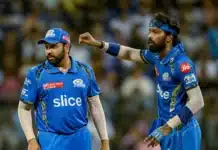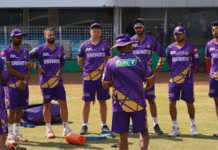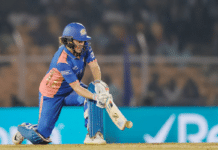The Men’s ODI World Cup 2023 has reached the semi-final stage in the race to play the final on November 19. Here we’ll summarize the latest action and news from the event and bring you insights from our reporters on the ground.
—
Match Preview: India vs New Zealand, Mumbai (2:00 pm IST; 8:30 am GMT; 7:30 pm AEDT)
The Unstoppable Force and the Shape-Changing Object
India is celebrating the World Cup of their wildest dreams and it has nothing to do with the fact that they are undefeated in it. That’s simply a byproduct of their pre-tournament planning. They left 2019 needing… more. So they went searching, trying out up to 50 different players over four years and 66 games. Six months after the masterpiece, they had identified who they wanted and were focused on honing their skills. In the 15 ODIs between March and October 2023, they picked all their XIs from a pool of 24.
Expect a cautious start. Each team tries with all its might not to make the first mistake, trying not so much to beat the rival as to survive. New Zealand is a master of this art; simply staying in the game long enough until there is an opportunity to break through.
team news
India (probable) 1 Rohit Sharma (captain), 2 Shubman Gill, 3 Virat Kohli, 4 Shreyas Iyer, 5 KL Rahul (wk), 6 Suryakumar Yadav, 7 Ravindra Jadeja, 8 Mohammed Shami, 9 Kuldeep Yadav, 10 Jasprit Bumrah, 11 Mohammed Siraj
New Zealand (probable) 1 Devon Conway, 2 Rachin Ravindra, 3 Kane Williamson (captain), 4 Daryl Mitchell, 5 Tom Latham (wk), 6 Glenn Phillips, 7 Mark Chapman, 8 Mitchell Santner, 9 Tim Southee, 10 Lockie Ferguson, 11 Trent Boult
Feature: Jasprit Bumrah is kind of exactly one
If you’ve seen it, you’ll immediately understand that the tone he’s set at the beginning of an entry is as relentless as McGrath used to set. Forget scoring, how is one expected to survive this?
Tactics board: Don’t lose the game within the first 15 overs
Must watch: Aaron Finch explains how Australia knows how to win
News headlines
Semi-final build-up: There’s no denying David Warner is an ODI GOAT
Among all the ODI greats Australia has produced, Warner is head and shoulders above them, and the lack of matches he has played only further highlights his extraordinary production. And at the World Cups, when the pressure is greatest, it has elevated his performance to a level that only the elite have achieved.
Mark Nicholas: In South Africa’s search for the future, there is no place for the heartbreaks of the past
To fully understand this, it is necessary to review three markers. The first, at the Sydney Cricket Ground in 1992, which said “South Africa needs 22 runs off 1 ball to win.” Ridiculous: blame the mathematicians. Although South Africa’s slow pace of overcoming had tipped the equation firmly in England’s favour.
The second, at Edgbaston in 1999, when only one run was needed in the last four balls of the match with the unbeaten player of the tournament, Lance Klusener, on strike. More on that in a minute.
The third, at Kingsmead in Durban in 2003 – which, to be fair to the South African protagonists, was a tight Duckworth-Lewis job – showed that a one-ball run was required when the batsmen in the middle thought none was required. of a single ball.



